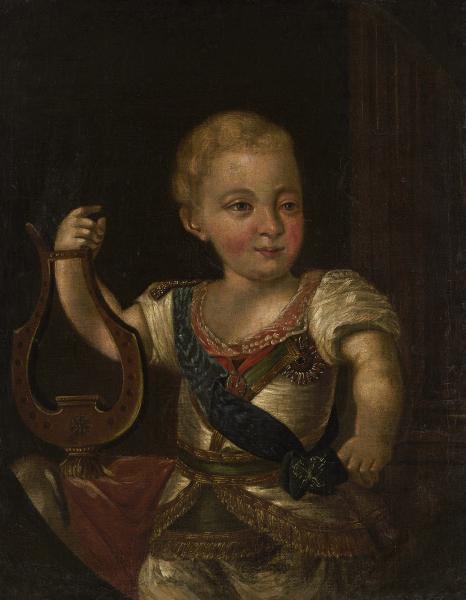The artist is unknown

Konstantin Pavlovich (May 8, 1779, Tsarskoye Selo − June 14, 1831, Vitebsk) − Grand Duke, second son of Emperor Paul I and Maria Fedorovna. For 16 days, from November 27 / December 9 to December 13/35, 1825, official institutions in St. Petersburg and Moscow recognized him as an emperor and autocrat of the All -Russian Konstantin I, although he never reigned and did not recognize his accession to the throne.
The 400th anniversary of the Romanov house. SPb, 2013. With. 111.
Konstantin Pavlovich (1779–1831) – second son of Grand Duke Pavel Petrovich and Grand Duchess Maria Fedorovna and, accordingly, the second grandson of Empress Catherine II. Participant in Italian and Swiss campaigns a. AT. Suvorov. In connection with the marriage of a person of non -imperial blood, he refused to inherit the Russian throne. After the death of Alexander I confirmed his renunciation. Participated in anti -Napoleon campaigns. Since 1814 – Commander -in -Chief of the Polish Army and the actual governor of Poland. During the Polish uprising of 1830–1831 he left Poland. On the way to Bialystok fell ill with cholera and died.
Was previously considered an image of Alexander Pavlovich. Defined with. AT. Moiseeva. A medal was knocked out for the birth of Constantine, on which the Temple of St. Sophia in Constantinople was represented in the distance and a rising star above it. The brightest prince of. AND. Potemkin made a brilliant holiday on the occasion of his birth: during the fireworks and illuminations he sang a choir in the new Greek language; The first nurse of the Grand Duke was the Greek woman Elena; Then Greek Dmitry Kurut, who remained at the Grand Duke, was assigned to him. August 17, 1787 State Secretary of Empress A. AT. Khrapovitsky noted in his “memorable notes”: “In the chest, he found for himself and read the secret project of KN. Potemkina-Tauride, so that, using Persian disorders, to take Baku and Derbent, and, having annexed Gilyan, call Albania for the future heritage of Grand Duke Konstantin Pavlovich ”(memorable notes a. AT. Khrapovitsky. With. 37). In one note of Catherine II, regarding the “Greek project” it also says: “If the successes of the war would have served the method and case of Russia to the perfect expulsion of the enemy of the name of Christ from the European limits, then Russia for all Christianity and family merit pronounces the restoration of barbarian ruins of the barbaric Powers of the ancient Greek Empire. Russia promises to leave this empire in perfect independence, hand and give to the younger Russian Grand Duke Konstantin Pavlovich … ”(Russian Biographical Dictionary. With. 156).
Leave a Reply